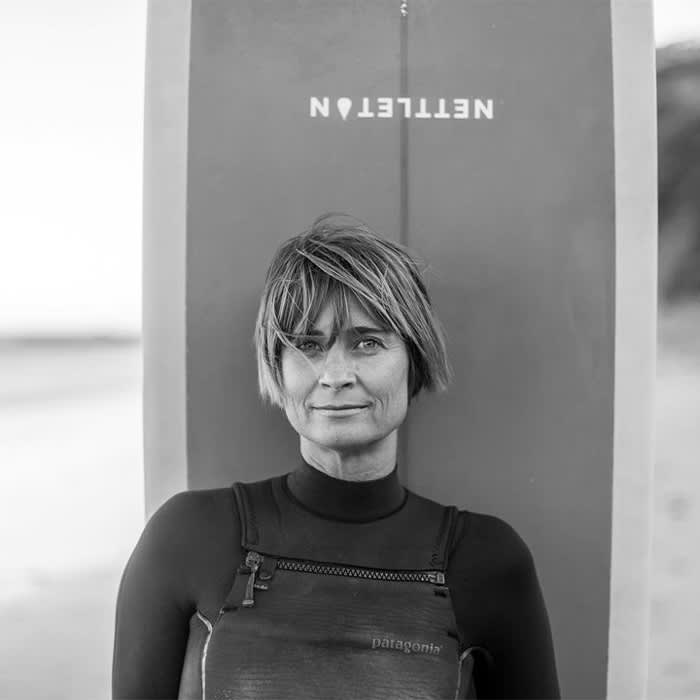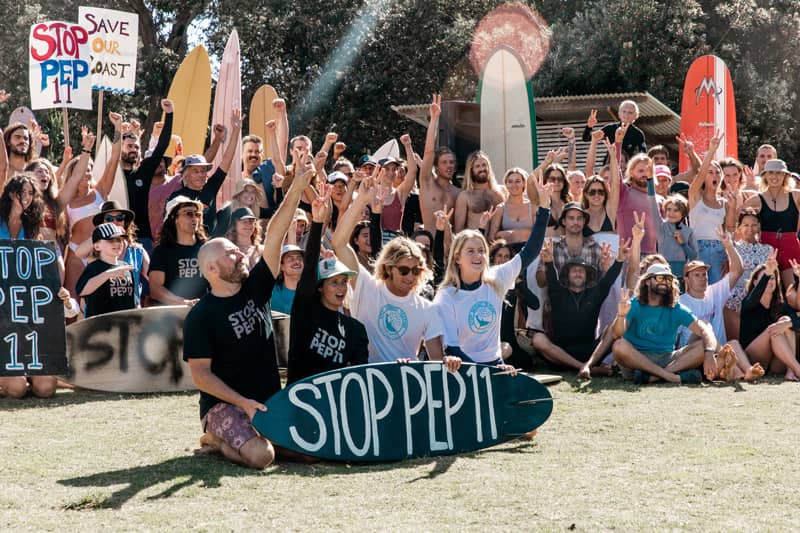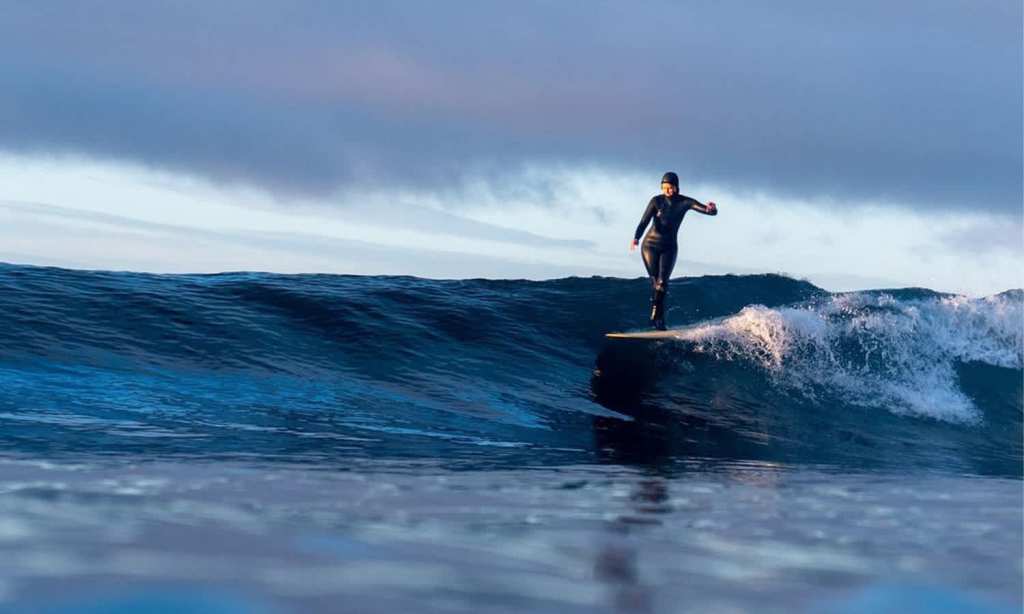While the eyes of the world fall upon Glasgow as head’s of state wrestle with their commitments to fighting climate change, at home the fossil fuel industry continues to march ahead.
If you’re a water person based around NSW, you may have heard of a little project called PEP11. It’s a cute name hiding some pretty terrifying plans for the future.
PEP11 stands for Petroleum Exploration Permit 11, a license to drill for oil and gas just off the coast from Manly to Newcastle in New South Wales, a total of 4576 km. These permits are generally sold off to oil and gas companies to allow then to drill in certain areas to look for fossil fuels.
Currently, the rights to drill in this region are owned by Advent Energy and Bounty Oil and Gas but only allow for exploratory drilling. That title is due to expire in February, however parent company BPH Energy have been petitioning to expand the title beyond that deadline and open up the region for offshore drilling.
This is in one of the most popular and famous coastlines in the country, home to around six million people or the vast majority of the state of NSW.
The Surfrider Foundation have been campaigning hard on the issue, and independent MP Zali Steggall introduced a private members bill last month to ban offshore drilling along the NSW coast.
That bill however was blocked, despite the Prime Minister saying that PEP11 would not be expanded under a Morrison government.
Belinda Baggs is an Australian professional longboard circuit champion and fierce campaigner for the ocean. She has been involved in similar fights for years and The Latch caught up with her via email to discuss the plans and what might happen if this project goes ahead.

The Latch: Surfing and environmentalism often go hand in hand, how has surfing helped deepen your connection to the land and the planet?
Belinda Baggs: As wave riders, we are completely reliant on a healthy marine ecosystem to enjoy the thing we love. It may be from a selfish place (always wanting to preserve the next ride, but I don’t think it’s possible to truly be a surfer and not be an environmentalist.
After spending countless hours at the same break, learning how the water moves, currents flow, bottom contours differ with storms from all directions, and water quality changes with rain or wind patterns you become quite intimately connected.
From the local creek or coastal development to climate impacts, the marine life and waves are so susceptible to any changes. If you want to keep surfing in thriving oceans, we must do all we can to protect our mother ocean from the many threats she faces.
I’ve been a surfer my whole life. Even before I could make it out the back my dad had me entrenched in a surfing lifestyle. It’s all I ever wanted and I feel so blessed to now have that deeper understanding and connection to the ocean.
TL: What kinds of experiences have you had with this type of offshore drilling?
BB: No offshore drilling comes without risk. I’ve spent many years surfing in California with oil rigs shadowed on the horizon- no one really thought twice about it, saying they’re safe and regulated well.
Funny story, It’s been pretty common for small leaks to deposit blobs of tar on the beaches, running in unaware after a surf I usually have it squishing in through my toes or smudged on my heel- it’s hard to get off with cheap mayonnaise doing the trick! Funny scene scraping tar off your feet with a jar of mayonnaise.
Not so funny story, now it’s these same beaches in Southern California that are now covered in 131,000 gallons of oil spill from a pipeline leak approximately four miles off the coast. This is an ecological disaster harming birds, fish and other wildlife whilst also having massive economic effects on tourism and fisheries and of course keeping surfers out of the water.
This is just one example of multiple disasters in our oceans that have occurred from drilling for fossil fuels with the most well-known Deep Water Horizon topping that list. There have also been minor spills Under Australian regulations including the Montara blowout off NW WA which is considered one of Australia’s worst environmental disasters.
TL: Surfers are often pretty vocal about environmental causes, what are some of the big wins they’ve been able to achieve when working together?
BB: The Fight For The Bight saw tens and thousands of surfers across the country and beyond rallying to plain stupid oil drilling plans in the Great Australian Bight.
A Norwegian Company Equinor’s own EP released spill modelling that saw oil on beaches from Albany in WA across all of Australia’s Southern coastline up to Port Macquarie and across to the west coast of NZ.
Alone, this was a rallying call that saw surfers come together, protesting in paddle-outs to stop this project going ahead. And we won! The Bight remains untouched and it was an indication that when enough of us surfers united we do have the power to protect the ocean.

TL: As a parent, what does seeing this kind of drilling proposal make you think about the future of the oceans and our interaction with them?
BB: My dream is to pass on pristine oceans to my son to continue this legacy of wave riding. Drilling and climate impacts from burning fossil fuels risk all that.
The latest IPCC Report gave us a code red warning- time is running out and we need to act now! All of the technology already exists and it also makes financial sense- its just the politicians and overpowering big oil and gas companies to allow us to see a renewable economy that will provide our next generation a future beyond survival. One where our kids can continue surfing, enjoying all the liberties we have.
Change is bold and beautiful, not something we need to be scared of- it’s our only hope.
TL: Finally, as an ambassador for Patagonia, how do you see businesses being able to lead the conversation and action on the climate emergency?
BB: In our current society, business has a huge role to play in taking action. When legislation is failing, and sports people who love wild spaces demand better, its a real opportunity for business to lead, creating solutions and innovating new technologies that allow us to continue doing the sports we love, the ones that deeply connect us to the planet – and in turn provide the will to protect these places we love.
Patagonia’s Yulex wetsuits is the perfect example of this. Innovating new and functional wetsuit material made out of rubber from a Hevea tree- FSC grown, not mined! And then sharing the technology with the wider surfing industry to follow (wet) suit.
Now surfers and ocean lovers have the choice to purchase products without costing the planet. Little by little, if all our products are sustainable we will no longer be in a situation where lifestyle costs the planet.
Read more stories from The Latch and subscribe to our email newsletter.







